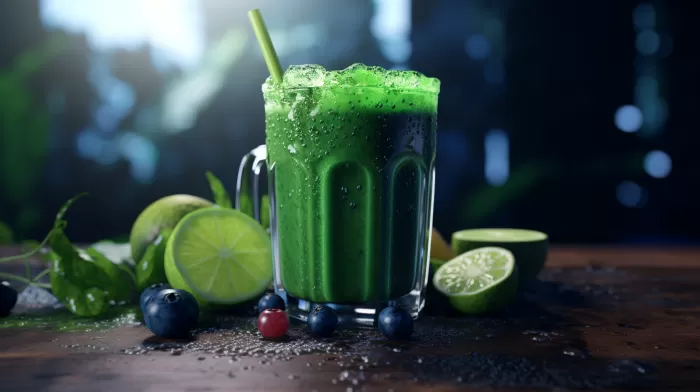When you hear the term “superfood,” you might immediately think of kale, quinoa, or chia seeds. But there is one superfood that remains relatively unknown to many people, despite an incredible array of health benefits it offers. Spirulina, a type of blue-green algae, is packed with nutrients and antioxidants that can seriously improve your overall health and well-being.
The nutritional profile of spirulina is impressive
Spirulina contains an astonishing amount of nutrients essential for a healthy body. It is rich in vitamins A, K, and B-complex, as well as essential minerals such as iron. Spirulina is also a great source of protein (more than 60% of its dry weight is protein!), making it a fantastic option for people who want to increase their protein intake without consuming meat products.
Natural detoxification and immune support
One of the reasons spirulina has gained attention as a superfood is its ability to cleanse our bodies of toxins and strengthen our immune systems. Despite the small size of this blue-green algae, it works wonders in aiding our body’s natural detoxification processes by removing harmful heavy metals and pollutants present in our system. Additionally, spirulina is rich in phycocyanin, which enhances our immune system and helps fight off infections.
A powerful antioxidant
Free radicals are molecules that can cause damage to our cells, contributing to aging and diseases such as cancer. The good news is that spirulina contains an abundance of antioxidants that help neutralize these harmful free radicals. Spirulina’s antioxidant power comes from compounds like phycocyanin, beta-carotene, and chlorophyll that work together to combat oxidative stress and reduce inflammation in the body.
Keeps your heart healthy
Cardiovascular health is no joke, and spirulina is a heart-healthy food you should consider incorporating into your diet. Its antioxidant properties help to decrease inflammation in blood vessels, improve circulation, and reduce blood pressure. Furthermore, spirulina can improve your blood lipid profile, reducing the levels of “bad” cholesterol (LDL) and increasing the levels of “good” cholesterol (HDL).
Promotes healthy digestion
If you have digestive problems, spirulina may be able to provide some relief. The high content of chlorophyll in spirulina aids with digestion and helps maintain a healthy bacterial balance in your gut. Additionally, spirulina is a good source of dietary fiber that promotes regular bowel movements and prevents constipation.
Boosts your energy levels
Feeling tired and sluggish all the time? Spirulina might be the answer to boosting your energy levels. The protein, complex carbohydrates, and essential vitamins and minerals in spirulina provide your body with the necessary fuel to keep you going throughout the day. Plus, its antioxidant properties help combat fatigue, allowing you to stay energetic and focused.
Improves mental health
Spirulina is not just good for your body, but it also benefits your mental health. It contains an amino acid called tryptophan, which is a precursor to serotonin, a neurotransmitter that regulates mood, sleep, and appetite. Having a sufficient level of serotonin in the brain is essential for maintaining a stable and positive mood.
Aids in weight management
For those who are trying to shed a few pounds, adding spirulina to your diet could be helpful. Its high protein content makes it a nourishing and filling option, helping to curb your appetite and prevent unhealthy snacking. Additionally, spirulina has been found to improve metabolism and increase fat burning, making it easier for you to reach your weight loss goals.
Enhances athletic performance
Athletes and fitness enthusiasts can benefit from incorporating spirulina into their diets. The high protein content of spirulina aids in muscle growth and recovery after exercise, while its antioxidant properties help reduce muscle soreness and inflammation. Moreover, some studies suggest that spirulina may improve endurance and reduce fatigue during prolonged exercise.
Promotes healthy skin and hair
Spirulina’s impressive nutrient profile benefits not only your internal organs but also your external appearance. The vitamins, minerals, and antioxidants in spirulina help nourish your skin, fight against damage from free radicals, and reduce inflammation that can lead to acne and other skin issues. Furthermore, the protein and iron in spirulina are essential for healthy hair growth.
Alleviates allergies
People who suffer from seasonal allergies may find relief in spirulina. Research indicates that the anti-inflammatory properties of spirulina may help reduce symptoms such as nasal congestion, sneezing, and itching.
Supports eye health
As we age, our eyes become more susceptible to damage, and that’s where spirulina comes in handy. The high content of vitamin A (beta-carotene) in spirulina is crucial for maintaining eye health and protecting against age-related macular degeneration, cataracts, and glaucoma.
Improves blood sugar control
Spirulina can be a useful addition to the diet for people with diabetes or those at risk of developing the condition. Studies show that spirulina may help lower blood sugar levels and improve insulin sensitivity, making it easier for your body to manage glucose effectively.
Protects against cancer
The potent antioxidant properties of spirulina may also help protect against cancer. Studies have found that phycocyanin, the pigment responsible for spirulina’s blue-green color, has the ability to inhibit the growth of cancer cells and trigger cell death in existing cancer cells.
How to use spirulina
Spirulina is commonly sold in powder form, which makes it easy to incorporate into your daily routine. Simply mix a teaspoon of spirulina powder into your favorite smoothie, juice, or even water. If you’re not a fan of the slightly seaweed-like taste, you can also find spirulina in tablet or capsule form.
In conclusion, spirulina is a nutrient-dense superfood that offers an impressive array of health benefits. Incorporating spirulina into your diet can help support your immune system, improve digestion, boost energy levels, and more, all while promoting healthy aging. Don’t miss out on the incredible advantages this blue-green algae has to offer.



